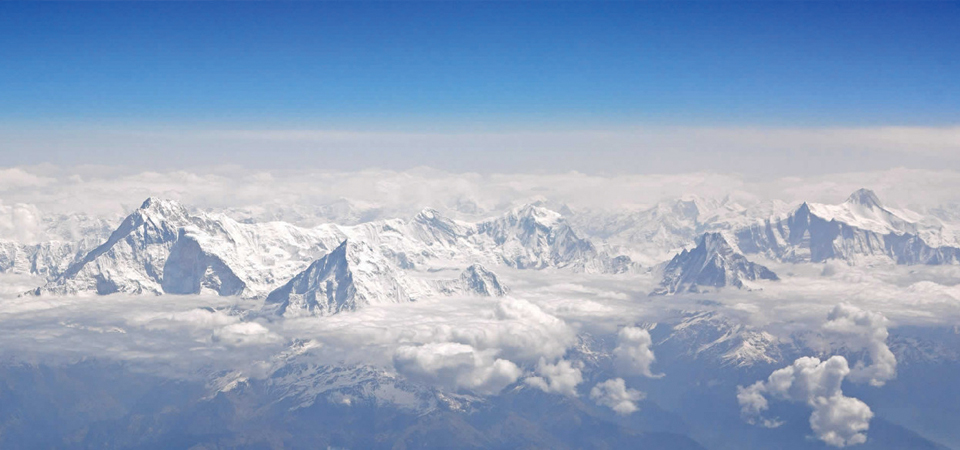Int'l Mountain Day marked

By A Staff Reporter
Kathmandu, Dec. 12: Today marked the 18th International Mountain Day (IMD) with the theme of ‘Sustainable Mountain Tourism’ to raise awareness about the importance of mountains for people and the planet.
Sustainable tourism in mountains can contribute to creating additional and alternative livelihood options and promoting poverty alleviation, social inclusion, as well as landscape and biodiversity conservation. However, the climate crisis is impacting mountain lives and livelihoods from recent avalanche fell from Tukuche Himal in Mustang to unprecedented rains in rain shadow areas like Manang and Mustang to Melamchi floods and the recent loss of agricultural products to unseasonal rains, experts said.
Nepal is already facing the brunt of climate change. Such unforeseen events are increasing and recurrence has also accelerated. Mountains are the main source of biodiversity, water resources, the origin of civilization and culture. These mountainous areas are at high-risk today due to the climate crisis, said Gobinda Bahadur Shahi, International Vice-Chair of Mountain Partnership Executive Director of Karnali Integrated Rural Development and Research Centre (KIRDARC) Nepal.
Speaking at a press conference organised to mark the IMD and also to announce the Mountain Advocacy Summit on “Unlocking Mountain Potentials: Connecting the Dots for Sustainable Planet (MAS2022)”, which is going to be held from March 13 to 14, 2022 in Mustang in collaboration with both state and non-state actors. Nepalese Civil Society Organisations, The Mountain Foundation Nepal (TMF), International Forum for Climate Change and Food Security (FOCUS International), Nepalese Civil Society Initiative (NCSMI) and KIRDARC are going to organize the Summit. KIRDARC Nepal will be the host, he informed.
The mountainous areas are at high risk due to the climate crisis. Rising temperature has its direct impact on mountainous areas, biodiversity, agriculture, life and livelihoods of not only mountainous regions but also downstream communities. It is important to lobby and advocate by promoting an accountable and responsible governance system for the development and protection of mountainous regions, Shahi informed.
Speaking at the programme, Min Bahadur Shahi, Secretary-General at the International Forum for Climate Justice and Food Security (FOCUS-International), said that the mountain agenda is a recently raised issue but climate change has a larger impact on the mountain and its livelihoods. The issue of mountains should be raised by the government, civil society, private sectors and local people, he added.
Presenting a paper, Geeta Pandey, ECCA Manager at KIRDARC, said that the summit is going to be organised to enhance accountability and collaboration among stakeholders to unlock the potential for implementation of actions that contribute to implementing the pledge for mountain resilience.
According to the United Nations, mountains are home to 15 per cent of the world´s population and host about half of the world's biodiversity hotspots. They provide fresh water for everyday life to half of humanity. Their conservation is a key factor in sustainable development and is part of Goal 15 of the Sustainable Development Goals (SDGs).
Recent News

Do not make expressions casting dout on election: EC
14 Apr, 2022
CM Bhatta says may New Year 2079 BS inspire positive thinking
14 Apr, 2022
Three new cases, 44 recoveries in 24 hours
14 Apr, 2022
689 climbers of 84 teams so far acquire permits for climbing various peaks this spring season
14 Apr, 2022
How the rising cost of living crisis is impacting Nepal
14 Apr, 2022
US military confirms an interstellar meteor collided with Earth
14 Apr, 2022
Valneva Covid vaccine approved for use in UK
14 Apr, 2022
Chair Prachanda highlights need of unity among Maoist, Communist forces
14 Apr, 2022
Ranbir Kapoor and Alia Bhatt: Bollywood toasts star couple on wedding
14 Apr, 2022
President Bhandari confers decorations (Photo Feature)
14 Apr, 2022











